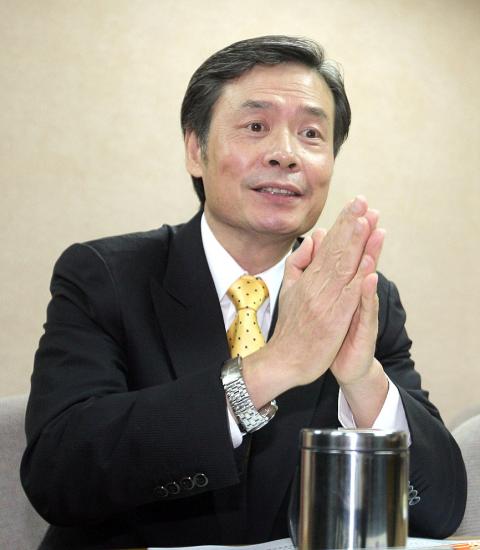Representative to the US King Pu-tsung (金溥聰) is to be appointed President Ma Ying-jeou’s (馬英九) chief adviser on national security affairs, a Presidential Office source said yesterday.
King is to take over the post of secretary-general of the National Security Council from Jason Yuan (袁健生), who is to be named a senior adviser to the president, the source said on condition of anonymity.
A “senior diplomat” will be appointed to fill the post of the nation’s representative to Washington, the source said, without giving a name.

Photo:CNA
The new appointments are part of the government’s efforts to promote regional peace and prosperity, and cope with new challenges in trade and economic relations with the US, cross-strait developments and changes in the national defense system, the source said.
In his new position, King will help the government improve its security cooperation with the US and push for Taiwan’s bid to join regional trade blocs, mainly the US-backed Trans-Pacific Partnership and ASEAN’s Regional Comprehensive Economic Partnership, the source said.
The connections that King has built in Washington during his posting will be very helpful to these efforts, the source said.
King replaced Yuan as head of the Taipei Economic and Cultural Representative Office in the US in December 2012.
King’s good political judgement and deep understanding of Taiwan’s situation can contribute to the government’s efforts to promote cross-strait ties, which have entered a new phase since the two sides began engaging in government-to-government exchanges, the source added.
Commenting on King’s new appointment, Democratic Progressive Party (DPP) spokesperson Chang Tun-han (張惇涵) yesterday said the Ma administration places little value on maintaining good Taiwan-US relations.
King lacks experience in handling cross-strait and national defense matters, and his transfer is not in the best interests of the nation, Chang said.
DPP Policy Research Committee executive director Joseph Wu (吳釗燮) said that King lacks the personal and professional experience to become the head of the National Security Council, a vital government unit tasked with overseeing cross-strait matters and foreign diplomacy.
Wu also questioned the timing of his transfer, with many suspecting it to be a ploy to manipulate the local elections in November.
The 57-year-old King, widely considered to be Ma’s closest aide, served as Taipei deputy mayor from 2004 to 2006, when Ma was mayor.
A year after he was elected president in 2008, Ma, who doubles as the Chinese Nationalist Party (KMT) chairman, appointed King as party secretary-general.
During the 2012 presidential election, King helped Ma with his re-election bid, serving as executive director of the president’s campaign office.
With a doctorate in journalism from the University of Texas in Austin, King has also taught at Taiwan’s National Chengchi University and at the Chinese University of Hong Kong.
In other news, the Executive Yuan yesterday said that Premier Jiang Yi-huah (江宜樺) had approved the resignation of Cabinet spokeswoman Cheng Li-wun (鄭麗文) and appointed Sun Lih-chyun (孫立群), vice chairman of the Fair Trade Commission (FTC), to take her place.
At the FTC, Sun succeeded in establishing a sound communication system between the administrative arm of the government and the media, the Cabinet said.
Additional reporting by Lee Hsin-fang

US President Donald Trump yesterday announced sweeping "reciprocal tariffs" on US trading partners, including a 32 percent tax on goods from Taiwan that is set to take effect on Wednesday. At a Rose Garden event, Trump declared a 10 percent baseline tax on imports from all countries, with the White House saying it would take effect on Saturday. Countries with larger trade surpluses with the US would face higher duties beginning on Wednesday, including Taiwan (32 percent), China (34 percent), Japan (24 percent), South Korea (25 percent), Vietnam (46 percent) and Thailand (36 percent). Canada and Mexico, the two largest US trading

China's military today said it began joint army, navy and rocket force exercises around Taiwan to "serve as a stern warning and powerful deterrent against Taiwanese independence," calling President William Lai (賴清德) a "parasite." The exercises come after Lai called Beijing a "foreign hostile force" last month. More than 10 Chinese military ships approached close to Taiwan's 24 nautical mile (44.4km) contiguous zone this morning and Taiwan sent its own warships to respond, two senior Taiwanese officials said. Taiwan has not yet detected any live fire by the Chinese military so far, one of the officials said. The drills took place after US Secretary

CHIP EXCEPTION: An official said that an exception for Taiwanese semiconductors would have a limited effect, as most are packaged in third nations before being sold The Executive Yuan yesterday decried US President Donald Trump’s 32 percent tariff on Taiwanese goods announced hours earlier as “unfair,” saying it would lodge a representation with Washington. The Cabinet in a statement described the pledged US tariffs, expected to take effect on Wednesday next week, as “deeply unreasonable” and “highly regrettable.” Cabinet spokeswoman Michelle Lee (李慧芝) said that the government would “lodge a solemn representation” with the US Trade Representative and continue negotiating with Washington to “ensure the interests of our nation and industries.” Trump at a news conference in Washington on Wednesday announced a 10 percent baseline tariff on most goods

THUGGISH BEHAVIOR: Encouraging people to report independence supporters is another intimidation tactic that threatens cross-strait peace, the state department said China setting up an online system for reporting “Taiwanese independence” advocates is an “irresponsible and reprehensible” act, a US government spokesperson said on Friday. “China’s call for private individuals to report on alleged ‘persecution or suppression’ by supposed ‘Taiwan independence henchmen and accomplices’ is irresponsible and reprehensible,” an unnamed US Department of State spokesperson told the Central News Agency in an e-mail. The move is part of Beijing’s “intimidation campaign” against Taiwan and its supporters, and is “threatening free speech around the world, destabilizing the Indo-Pacific region, and deliberately eroding the cross-strait status quo,” the spokesperson said. The Chinese Communist Party’s “threats